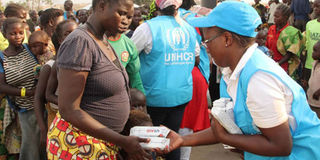Probe unearths 300,000 ghost refugees in Uganda

Support. Congolese refugees receive food from UNHCR officials in Hoima District in 2017. PHOTO BY FRANCIS MUGERWA
What you need to know:
- In February, the government detected suspected inflation of numbers of refugees and fraud leading to the suspension of four government officials, including the Commissioner for Refugees in the Office of the Prime Minister, Mr Apollo Kazungu.
- In February, following mismanagement of money and relief supplies to refugees by the OPM and the UN refugees agency, the British government announced a suspension of millions of pounds in humanitarian aid for the refugees in Uganda.
Kampala. A joint investigation by government and United Nations agencies on allegations of corruption in refugee management has found 300,000 ghosts in the country.
The joint verification exercise, which was carried out by Office of the Prime Minister and United Nations High Commissioner for Refugees (UNHCR), took eight months and found out that there were only 1.1 million refugees from the 1.4 million which the two agencies had earlier claimed to have received.
“This represents 75 per cent of the population that had sought asylum in Uganda prior to the start date in March 2018. An additional number of cases were closed upon verification due to death or spontaneous return to their countries of origin,” reads in part a joint statement by government and UNHCR released yesterday.
In February, the government detected suspected inflation of numbers of refugees and fraud leading to the suspension of four government officials, including the Commissioner for Refugees in the Office of the Prime Minister, Mr Apollo Kazungu.
Influx
Most of the refugees were from DR Congo and South Sudan that were facing armed struggles in their countries.
Both OPM and UNHRC officials have attributed the inflated numbers to multiple registration of refugees, especially between mid-2016 and mid-2017 when there were huge numbers coming in from South Sudan.
Ms Duniya Khan, the UNHCR spokesperson, when contacted yesterday about the implication of the ghost refugees said going by global standards, the discovered number is not significant given the challenging operation to save lives they were faced with then.
“It is not a surprise in such an operation...between July 2016 and July 2017 we were receiving huge numbers from South Sudan. Sometimes 3,000 refugees which was above the mark a day. There were days we received 7000-8000. There were instances where people registered multiple times,” Ms Khan said.
She said the new data has helped them to be on one page with government officials.
Ms Khan, however, could not tell how much money was lost due to the inflated numbers because they have been underfunded and overstretched to the limit.
“Food was never enough. You could find 200 children studying in one classroom. It is not significant. We have been asking for more money from international community,” she said.
After the verification, the government and UN agencies have set up new rules to deal with fraud.
“Progressively, as the verification was completed in the settlements, new food collection procedures were rolled out by WFP and UNHCR, including biometric verification of all beneficiaries upon receiving assistance. These procedures mitigate the risks of fraud, ensuring that assistance is well managed and is provided only to verified refugees and asylum-seekers,” the statement reads in part.
Donors withdraw support
In February, following mismanagement of money and relief supplies to refugees by the OPM and the UN refugees agency, the British government announced a suspension of millions of pounds in humanitarian aid for the refugees in Uganda. The British Department for International Development communicated the decision to UNHCR office in Nairobi, and Mr Micheal Holstein, the head of Inspector General’s Office - Africa region, flew in the country to coordinate a major UN-led investigation into the alleged abuse of millions of dollars for the refugees. Sources told this newspaper then that Mr Holstein, without disclosing the amounts, announced that the British government took a decision to withhold funds for the refugees in Uganda and demanded action on thieving officials at UNHCR and OPM.




